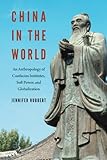China in the World : An Anthropology of Confucius Institutes, Soft Power, and Globalization / Jennifer Hubbert.
Material type: TextPublisher: Honolulu : University of Hawaii Press, [2019]Copyright date: ©2019Description: 1 online resource (246 p.)Content type:
TextPublisher: Honolulu : University of Hawaii Press, [2019]Copyright date: ©2019Description: 1 online resource (246 p.)Content type: - 9780824878207
- 9780824878535
- 306.44/951 23
- PL1069.K66 H83 2019eb
- online - DeGruyter
- Issued also in print.
| Item type | Current library | Call number | URL | Status | Notes | Barcode | |
|---|---|---|---|---|---|---|---|
 eBook
eBook
|
Biblioteca "Angelicum" Pont. Univ. S.Tommaso d'Aquino Nuvola online | online - DeGruyter (Browse shelf(Opens below)) | Online access | Not for loan (Accesso limitato) | Accesso per gli utenti autorizzati / Access for authorized users | (dgr)9780824878535 |
Browsing Biblioteca "Angelicum" Pont. Univ. S.Tommaso d'Aquino shelves, Shelving location: Nuvola online Close shelf browser (Hides shelf browser)

|

|

|

|

|

|

|
||
| online - DeGruyter The Dreaming Mind and the End of the Ming World / | online - DeGruyter The Past before Us : Moʻokūʻauhau as Methodology / | online - DeGruyter Korea’s Premier Collection of Classical Literature : Selections from Sŏ Kŏjŏng’s Tongmunsŏn / | online - DeGruyter China in the World : An Anthropology of Confucius Institutes, Soft Power, and Globalization / | online - DeGruyter Pacific Women in Politics : Gender Quota Campaigns in the Pacific Islands / | online - DeGruyter Philosophies of Place : An Intercultural Conversation / | online - DeGruyter The Writ of the Three Sovereigns : From Local Lore to Institutional Daoism / |
Frontmatter -- Contents -- Acknowledgments -- 1. An Anthropology of International Relations -- 2. The Culture of Cultures -- 3. Coolness and Magic Bullets: Studying Chinese to Manage Risk and Constitute a Self -- 4. Conjuring Commensurability and Particularity: Reconfiguring Local and Global -- 5. Imagining the State: Constitutions and Conceptions of Government and Governance -- 6. Rethinking "Free" Speech: Debates over Academic Independence -- 7. The Sites and Struggles of Global Belonging -- Notes -- References -- Index
restricted access online access with authorization star
http://purl.org/coar/access_right/c_16ec
Confucius Institutes, the language and culture programs funded by the Chinese government, have been established in over 1,500 schools worldwide since their debut in 2004. A centerpiece of China's soft power policy, they represent an effort to smooth China's path to superpower status by enhancing its global appeal. Yet Confucius Institutes have given rise to voluble and contentious public debate in host countries, where they have been both welcomed as a source of educational funding and feared as spy outposts, neocolonial incursions, and obstructions to academic freedom. China in the World turns an anthropological lens on this most visible, ubiquitous, and controversial globalization project in an effort to provide fresh insight into China's shifting place in the world.Author Jennifer Hubbert takes the study of soft power policy into the classroom, offering an anthropological intervention into a subject that has been dominated by the methods and analyses of international relations and political science. She argues that concerns about Confucius Institutes reflect broader debates over globalization and modernity and ultimately about a changing global order. Examining the production of soft power policy in situ allows us to move beyond program intentions to see how Confucius Institutes are actually understood and experienced in day-to-day classroom interactions. By assessing the perspectives of participants and exploring the complex ways in which students, teachers, parents, and program administrators interpret the Confucius Institute curriculum, she highlights significant gaps between China's soft power policy intentions and the effects of those policies in practice.China in the World brings original, long-term ethnographic research to bear on how representations of and knowledge about China are constructed, consumed, and articulated in encounters between China, the United States, and the Confucius Institute programs themselves. It moves a controversial topic beyond the realm of policy making to examine the mechanisms through which policy is implemented, engaged, and contested by a multitude of stakeholders and actors. It provides new insight into how policy actually works, showing that it takes more than financial wherewithal and official resolve to turn cultural presence into power.
Issued also in print.
Mode of access: Internet via World Wide Web.
In English.
Description based on online resource; title from PDF title page (publisher's Web site, viewed 02. Mrz 2022)


